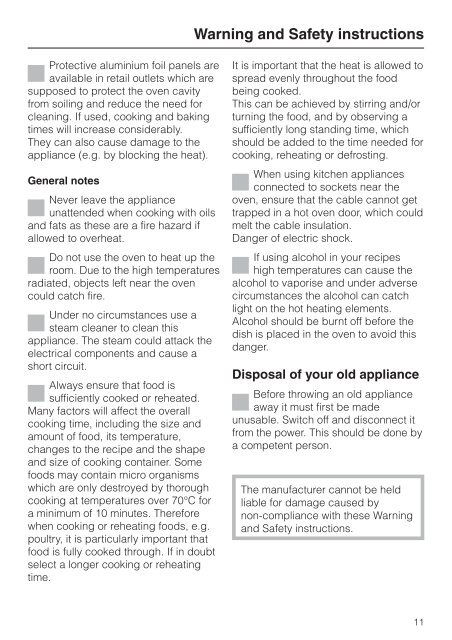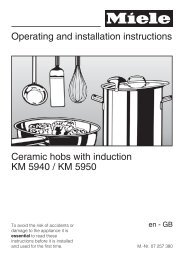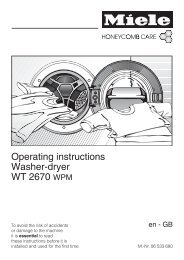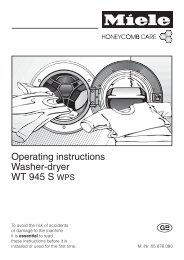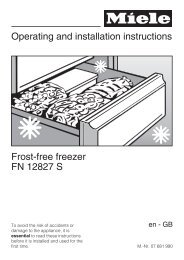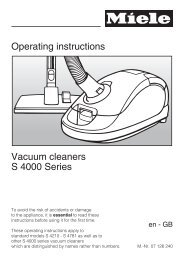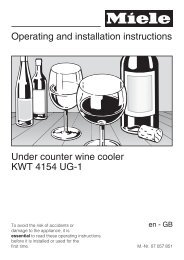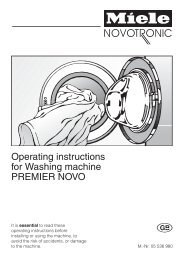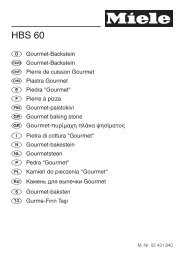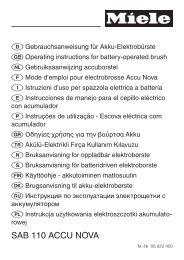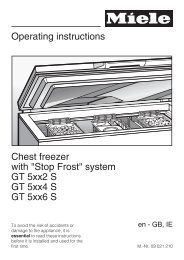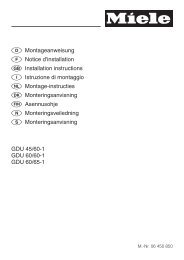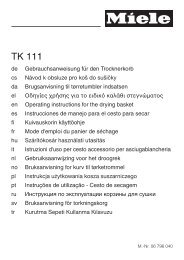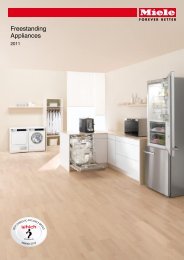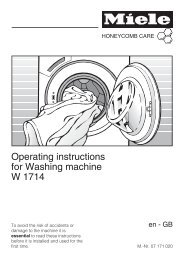Operating instructions Double Oven H 348 B2 H 349 B2 - Miele
Operating instructions Double Oven H 348 B2 H 349 B2 - Miele
Operating instructions Double Oven H 348 B2 H 349 B2 - Miele
You also want an ePaper? Increase the reach of your titles
YUMPU automatically turns print PDFs into web optimized ePapers that Google loves.
Protective aluminium foil panels are<br />
available in retail outlets which are<br />
supposed to protect the oven cavity<br />
from soiling and reduce the need for<br />
cleaning. If used, cooking and baking<br />
times will increase considerably.<br />
They can also cause damage to the<br />
appliance (e.g. by blocking the heat).<br />
General notes<br />
Never leave the appliance<br />
unattended when cooking with oils<br />
and fats as these are a fire hazard if<br />
allowed to overheat.<br />
Do not use the oven to heat up the<br />
room. Due to the high temperatures<br />
radiated, objects left near the oven<br />
could catch fire.<br />
Under no circumstances use a<br />
steam cleaner to clean this<br />
appliance. The steam could attack the<br />
electrical components and cause a<br />
short circuit.<br />
Always ensure that food is<br />
sufficiently cooked or reheated.<br />
Many factors will affect the overall<br />
cooking time, including the size and<br />
amount of food, its temperature,<br />
changes to the recipe and the shape<br />
and size of cooking container. Some<br />
foods may contain micro organisms<br />
which are only destroyed by thorough<br />
cooking at temperatures over 70°C for<br />
a minimum of 10 minutes. Therefore<br />
when cooking or reheating foods, e.g.<br />
poultry, it is particularly important that<br />
food is fully cooked through. If in doubt<br />
select a longer cooking or reheating<br />
time.<br />
Warning and Safety <strong>instructions</strong><br />
It is important that the heat is allowed to<br />
spread evenly throughout the food<br />
being cooked.<br />
This can be achieved by stirring and/or<br />
turning the food, and by observing a<br />
sufficiently long standing time, which<br />
should be added to the time needed for<br />
cooking, reheating or defrosting.<br />
When using kitchen appliances<br />
connected to sockets near the<br />
oven, ensure that the cable cannot get<br />
trapped in a hot oven door, which could<br />
melt the cable insulation.<br />
Danger of electric shock.<br />
If using alcohol in your recipes<br />
high temperatures can cause the<br />
alcohol to vaporise and under adverse<br />
circumstances the alcohol can catch<br />
light on the hot heating elements.<br />
Alcohol should be burnt off before the<br />
dish is placed in the oven to avoid this<br />
danger.<br />
Disposal of your old appliance<br />
Before throwing an old appliance<br />
away it must first be made<br />
unusable. Switch off and disconnect it<br />
from the power. This should be done by<br />
a competent person.<br />
The manufacturer cannot be held<br />
liable for damage caused by<br />
non-compliance with these Warning<br />
and Safety <strong>instructions</strong>.<br />
11


